Grabar-Kitarović Declines Comment on Her Candidacy for NATO Secretary-General
ZAGREB, 5 April 2022 - Former Croatian president Kolinda Grabar-Kitarović on Tuesday would not give an answer when asked if she saw herself as the next NATO Secretary-General, saying the appointment should be based on qualifications and not on sex.
The moderator of a panel discussion at the US-Croatia Forum focusing on the representation of women in the security and economy sectors asked the former president if time had come for NATO to have a woman secretary-general and if she saw herself in that role.
"The next NATO Secretary-General must be chosen exclusively based on their work, education, ethics, competence, experience and all the other aspects we insist on when selecting someone for a position," she said.
"You have nothing to add?" the moderator asked.
"Nothing to add. We can discuss the women's quota, but that is an entirely different matter," said the former president, who some say is a potential successor to current NATO Secretary-General Jens Stoltenberg.
Grabar-Kitarović said earlier at the panel that NATO was the most women-friendly of all environments she had worked in, where she was treated "as a person, not as a woman."
She noted that it had been her experience so far that she had to use much more energy than her male colleagues to be taken seriously in the same posts, calling on media not to treat women in positions of power differently than their male colleagues and noting that her statements had on many occasions been taken out of context as well as that the media scene was often misogynistic and sexist.
When someone feels insulted on ethnic grounds, that is hate speech, but that is not the case when insults are based on a person's sex, she said.
"I'm far from being satisfied with the world we live in and am determined to work on a fairer society for all daughters, sisters and other women," she said, noting that education is the key.
Government Commissioner to Run Split Until Early Election, Ministry Says
ZAGREB, 5 April 2022 - The Justice and Administration Ministry said on Tuesday it had not yet received the resignations announced by Split Mayor Ivica Puljak and his first deputy Bojan Ivošević, and that in the event of an early election, the city until then would be governed by a government commissioner.
The ministry said the appointment of a government commissioner in local government units was defined by law and that the commissioner's powers pertained only to technical governance, to ensure the functioning of local services.
In the event that Puljak resigns as announced, he would do so after less than one year in office , so an early election for the mayor of Split and his two deputies would have to be called, the ministry said, adding that the law does not envisage the possibility of the second deputy mayor acting as mayor.
After announcing his and Ivošević's resignations last week, Puljak said the city would be governed until the election by his second deputy, Antonio Kuzmanić, and not a government-appointed commissioner. This opinion has been supported by many constitutional law experts.
Speaking to Hina today, Puljak said that neither he nor Ivošević would accept any other, let alone "incorrect interpretation of the law," citing the opinion of those experts.
He said Kuzmanić would resign when the City Council was dissolved. "We know that the HDZ wants to find any excuse to avoid elections for the City Council."
The HDZ said this was "a dangerous precedent", calling out Puljak for putting Ivošević's political interest above the rule of law.
The Bridge party, whose city councillors made up the ruling majority together with Puljak until recently, have announced their resignations and called on Kuzmanić to resign as second deputy mayor.
Kuzmanić said today that he would not tender his resignation on Friday, when Puljak and Ivošević are expected to officially resign, noting that he would stay in his post until the entire City Council resigned.
He was commenting on announcements that the government would appoint a commissioner for Split, saying he wanted to know based on which article of the relevant law the government would replace him if he did not tender his resignation.
"I'm willing to resign as soon as the entire opposition (in the City Council), that is, the HDZ, resigns. When the City Council is dissolved, my resignation will be on the table,” Kuzmanić said.
Puljak announced his and Ivošević's resignation and that Kuzmanić would run Split until an early election after the parties in the City Council supporting him suspended their cooperation with him, insisting that Ivošević be removed from office after he was indicted for threatening a reporter of the Split-based Slobodna Dalmacija daily.
Refusing to replace Ivošević, Puljak said last Thursday they would both resign and go to a snap election. Puljak said his deputy did not threaten the reporter's life, that his communication was indeed inappropriate but that one did not go to jail for that.
My Resignation Is Not On the Table, Interior Minister Says
ZAGREB, 5 April 2022 - Interior Minister Davor Božinović said on Tuesday, after the European Court of Human Rights judgment in the case of six-year-old Afghan migrant girl Madina Hussiny has become final, that his resignation was not on the table and that the purpose of such rulings was to improve the system.
"In cases like this the burden of responsibility is always on the system. We need to see what can and should be rectified," Božinović told the press on the sidelines of the second day of the US Croatia Forum in Zagreb when asked whether he considered himself responsible and whether he would step down.
He said that the point of such court rulings was to rectify the shortcomings of the system through rules or improvements of practice. "The purpose of courts is to draw attention to such shortcomings," he added.
Božinović said that the death of the little migrant girl was a tragedy that affected everyone. "It happened in the territory of another country. An investigation was conducted and the court reached its conclusion. Now we have to find solutions and adopt measures to improve the system," the minister said.
The judgment, which found that Croatia violated the girl's right to life, has become final after the Grand Chamber of the European Court of Human Rights rejected the Croatian application for re-examination of the case.
The Centre for Peace Studies (CMS) said today that the government and Prime Minister Andrej Plenković could no longer look away but must urgently replace those responsible, including the minister of the interior, national chief of police Nikola Milina, head of the Directorate for Borders Zoran Ničeno, and state secretary Terezija Gras.
Croatian authorities will now have to take concrete steps to ensure that something like this never happens again, the CMS said. It urged the government to adopt measures to stop illegal and violent expulsions of illegal migrants from Croatia, ensure efficient investigations, punish perpetrators, and ensure full independence and efficiency of the police oversight mechanism.
Madina Hussiny was hit by a train at the Croatia-Serbia border in November 2017 after the Croatian authorities allegedly denied her family the opportunity to seek asylum and ordered them to return to Serbia along the tracks.
The Strasbourg-based court found Croatia responsible for a number of violations of rights under the European Convention on Human Rights - the right to life, the prohibition on inhuman and degrading treatment, the prohibition of collective expulsions of aliens, the right to security and liberty, and the right of individual petition.
Srijem Border Thoroughfare to be Completed in Maximum 4 Years
April 5, 2022 – Minister Oleg Butković visited the Vukovar-Srijem County on Monday, where he held meetings discussing the construction of the Srijem border thoroughfare.
As Glas Slavonije writes, the project will be completed within a maximum of four years.
The Minister of the Sea, Transport, and Infrastructure, Oleg Butković paid a working visit to Vukovar-Srijem County on Monday, held a meeting in Ilok with the representatives of the County, and attended the inaugural conference of the project "Construction of the Apševac and Lipovac Thoroughfares".
This is a project by Hrvatske Ceste, which represents the first of the remaining three phases of the Srijem Border Thoroughfare construction project, and includes the construction of a road that will bypass the D57 section of the state road through the villages of Apševci and Lipovac. The grant agreement was signed in March last year, with the total eligible costs of the project amounting to 106 million kuna.
"We have secured funds for one of the most important infrastructure projects in this area, which is being implemented in phases. A few years ago, looking for an opportunity to get started, we obtained the necessary European funds and signed a contract as soon as we had building permits. Our plan is to obtain all building permits by the end of this year, and it is up to Hrvatske Ceste to speed up this process. We will ask for either European funding or as a state take charge of this and some other projects, and therefore I cannot say exactly when the Srijem Border Thoroughfare will be completed", said Butković, explaining that the duration of construction is affected by complaints and tenders, that is, something that is beyond the power of the minister, but that he will give strong support to the project as a matter of priority. He emphasized that the realization of this project involves much more than the transport infrastructure itself, given that construction is of importance for the demography as well as security of eastern Croatia, so he will try to do as much as possible during the mandate of this Government.
"We will not finish everything in two years, it is impossible, but I believe that it will be realized in four years at most. It was previously estimated that the entire project will cost one billion kuna, but we are witnessing an increase in the prices of energy and materials, which makes it difficult to calculate how much it will amount to", stated Butković.
The Vukovar-Srijem County Prefect Damir Dekanić emphasized that they discussed several strategic projects that will deal with the development of the economy and the return, i.e. the staying of the population in the Vukovar-Srijem County.
For more, check out our politics section.
Final Verdict of the ECHR: Croatia Responsible for Death of Madina Hosseini
April 5, 2022 - The European Court of Human Rights rejected Croatia's request to reconsider the case of the family of little Madina Hosseini, which confirmed the previous verdict and the responsibility of the Republic of Croatia for the tragedy arising from it. Interior Minister Davor Božinović says his resignation is ''not on the table'' following the ruling.
Tportal.hr reports that, in the tragic death of six-year-old Madina Hosseini, the European Court of Human Rights (ECHR) last year found the Republic of Croatia responsible for numerous human rights violations under the Convention for the Protection of Human Rights and Fundamental Freedoms: the right to life, the prohibition of torture and inhuman treatment, the prohibition of the collective expulsion of aliens, the right to security and liberty and the right to institute legal proceedings. The Republic of Croatia requested a reconsideration of the case, but the court rejected the request on Monday. The Center for Peace Studies reported on its Facebook page, stating that the case of little Madina Hosseini is finally over.
''The Grand Council of the European Court of Human Rights rejected the request of the Republic of Croatia to reconsider the case of little Madina's family and thus reaffirmed the verdict that the Republic of Croatia violated Madina's right to life, treated children inhumanely, kept the whole family illegally, and part of the family was collectively expelled from Croatia, and after all that, they were denied access to lawyers'', Center for Peace Studies shared on their Facebook page.
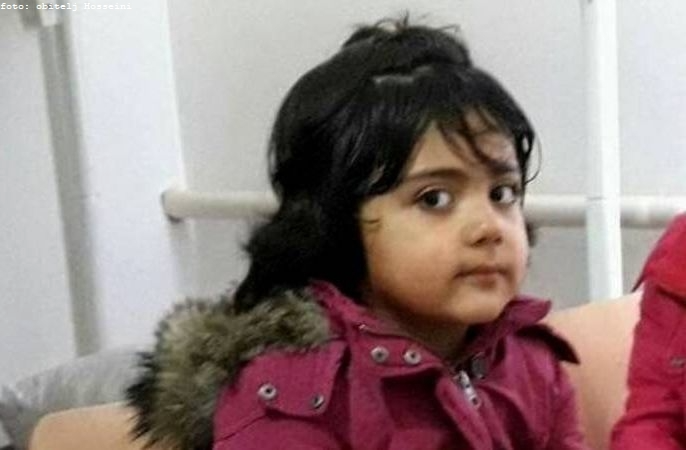
Madina Hosseini (Photo: Hosseini family)
The Office of the Croatian Representative before the European Court of Human Rights also informed that the verdict had been passed and that it had become final by rejecting the Croatian request.
''On April 4, 2022, a committee of five judges of the Grand Council of the European Court of Human Rights rejected the request of the Republic of Croatia to submit the case of MH to the Grand Council. Thus, the judgment of the Council of 18 November 2021 became final and the procedure of its execution will follow'', the Office said in a statement.
The full verdict of the European Court of Human Rights in the case of little Madina Hosseini on 18 November 2021 can be read (in Croatian) in Tportal's original article.
This judgment of the ECHR confirms various problems that many actors have been pointing out for many years and about which we report to the Croatian Parliament, the competent authorities, and the public. This primarily refers to the lack of an effective investigation into allegations of human rights violations of migrants, which is necessary in order for the authorities to dispel suspicions or confirm the allegations, Ombudsman Tena Simonovic Einwalter said in November last year.
In this case, it also referred to the work of the police, the State Attorney's Office, and the judiciary, with the ECHR assessing the effectiveness of the investigation in a different way than the Constitutional Court and, among other things, the way in which the effectiveness of the investigation was examined was indicated in a separate opinion by three judges. To maintain the rule of law in which no one, especially the police, can be above the law, an effective investigation is crucial, taking into account information provided by the mother and police officers about the tragic event, which includes all available information to establish the factual situation (including recordings of thermal imaging cameras, data on the movement and location of police officers by recording the signals of their mobile devices, police vehicles via GPS devices or members of the Hosseini family via their mobile devices), said Ombudswoman Simonovic Einwalter. According to the judgment of the ECHR, and as we ourselves warned, the competent authorities failed to do so, she added.
In the part related to the restriction of freedom of movement of Madina's family with eight children, they warned that it was not clear which procedures were used during the individual assessment of whether other measures, alternatives to detention, could have served the same purpose. In doing so, the proceedings themselves were conducted in the English language, which M. Hosseini's mother did not understand.
How has the Croatian Interior Minister responded?
The Center for Peace Studies issued a statement today stating that "after this strong and final confirmation of the verdict, the Government of the Republic of Croatia and Prime Minister Andrej Plenković can no longer turn their heads, but must urgently dismiss those responsible led by Interior Minister Davor Božinović''.

Minister of Interior, Davor Božinović, at the US-Croatian Forum in Zagreb which began yesterday. (Photo: Igor Soban/PIXSELL)
Following the ECHR ruling, Božinović said today that "his resignation is not on the table", N1 reports.
"As a minister, I can say, as I said, that it is a tragedy. That it affects us all. Certain investigative actions have been carried out, the court has concluded what it has concluded and we need to take measures to improve the system. My resignation is not on the table."
He said the responsibility in such cases is on the system.
"We have to see what are all the things that can and should be corrected. This was the case in other cases as well. The point of these judgments is to actually fix the system and it is always a matter of correcting what is stated as a defect. Either through certain solutions when it comes to regulations or by changing some practices. The function of the court is precisely to point out such shortcomings", said the Minister.
Journalists also asked the minister if his position was "on ice" because of this verdict.
"Reconstruction is something the prime minister will decide on."
For more, check out our politics section.
Croatia Reports 835 New Coronavirus Cases, 15 Deaths
ZAGREB, 5 April 2022 - In the last 24 hours, 835 coronavirus cases, out of 5,261 tests, and 15 related deaths have been registered in Croatia, the national COVID-19 crisis management team said on Tuesday.
There are 7,321 active cases, including 619 hospitalised patients, of whom 34 are on ventilators, while 5,145 persons are self-isolating.
Croatia has registered 1,103,662 coronavirus cases to date and the death toll is 15,634.
To date, 59.44% of the total population, that is 70.7% of adults, have been vaccinated, including 68.6% of adults fully.
Croatia Fourth European Country to Enter US Global Entry Program
ZAGREB, 5 April 2022 - Croatia and the United States on Monday signed an agreement on Croatia's entry into the Global Entry program, which will grant some Croatian nationals privileged entry into the US.
Croatia has become the fourth European country to enter this program. Minister of the Interior Davor Božinović said: "This is an expedited procedure that America grants only to those countries and systems with which it has achieved this level of trust."
Global Entry is a program of the US Department of Homeland Security that allows expedited clearance for pre-approved travellers upon arrival in the United States. Such travellers will not have to wait in a line to get through border control, said Gabriel Escobar, the Deputy Assistant Secretary of State for European Affairs and Special Envoy to the Western Balkans.
He said this agreement with Croatia signals the level of trust the US has in its Croatian partners, and the level of their strategic relationship and friendship.
Washington has signed this agreement with only three other European countries - Germany, the United Kingdom and Switzerland.
As of October last year, Croatian nationals no longer need a visa for trips to the United States of up to 90 days.
"This is a firm pledge for our future cooperation. There are a lot of challenge before us - the war in Ukraine and everything that contemporary threats bring. That's why we have services working together on a daily basis, exchanging information and fighting together in a world full of challenges to preserve what is the most valuable to us, and that is our way of life," Božinović said, adding that this was the 12th agreement signed with the US in the last five years.
In addition to the Global Entry agreement, Božinović and Escobar also signed the Partnership for Education agreement, which aims to increase the capabilities of the police in Croatia and the Western Balkans in combating transnational crime and terrorism.
We are looking forward to greater cooperation in discovering, countering and deterring transnational organised crime and terrorist actors in the Western Balkans, Escobar said.
The Croatian-US forum marking the 30th anniversary of the establishment of diplomatic relations between the two countries ends on Tuesday.
Croatian Wine Region: A Brief Recap of Dalmatia
5 March 2022 - With its diverse climate and terrains, winemakers produce over 45,000 tons of Croatian annually, alongside an astounding variety of award-winning wines. In line with the Dalmatian Wine Festival taking place this week in Split (April 8-9, 2022), here’s a refresher on Croatian wine and winemaking in this region.
Croatian wine and viticulture
Did you know that almost 85% of Croatians drink wine? Perhaps it comes as no surprise considering viticulture has been present in the region for almost 4,000 years.
Today, the tradition of winemaking is still going strong. Croatia has over 300 wine producing regions, clustered into 4 main geographical areas - the Croatian Uplands, Slavonia/Croatia Danube, Istria/Kvarner and Dalmatia. The differing climates and terrains between the 4 regions produce more than 130 indigenous grape varietals and distinct styles of wine.

The vineyards of Korčula. (Image: Visit Korčula/Facebook screenshot)
Although the majority of wines produced are either white (67%) or red (32%), the wide variety of local grapes means that you’ll be able to find anything from bottles of dry, fruity white wines to luscious full-body reds that are a delightful addition to any meal.
To know more about different wines and wine regions around Croatia, be sure to read our series on Croatian wine regions.
Wine production in the Dalmatian region
As far back as the beginning of the 3rd century, works of Greek writer Athenaeus contained verses describing the high-quality wines produced on the Dalmatian islands of Vis, Hvar and Korčula.
The coastline is ideal for grape cultivation due to its hot summers (21–27 °C) and mild winters (6–11 °C) that do not typically fall below freezing. Dalmatia is also ranked as one of the sunniest places in Europe, receiving an average of 2,700 hours of sun per year.
These conditions make it ideal for grape production, resulting in the number of indigenous grape varieties in Dalmatia far exceeding that of the other 3 regions combined!
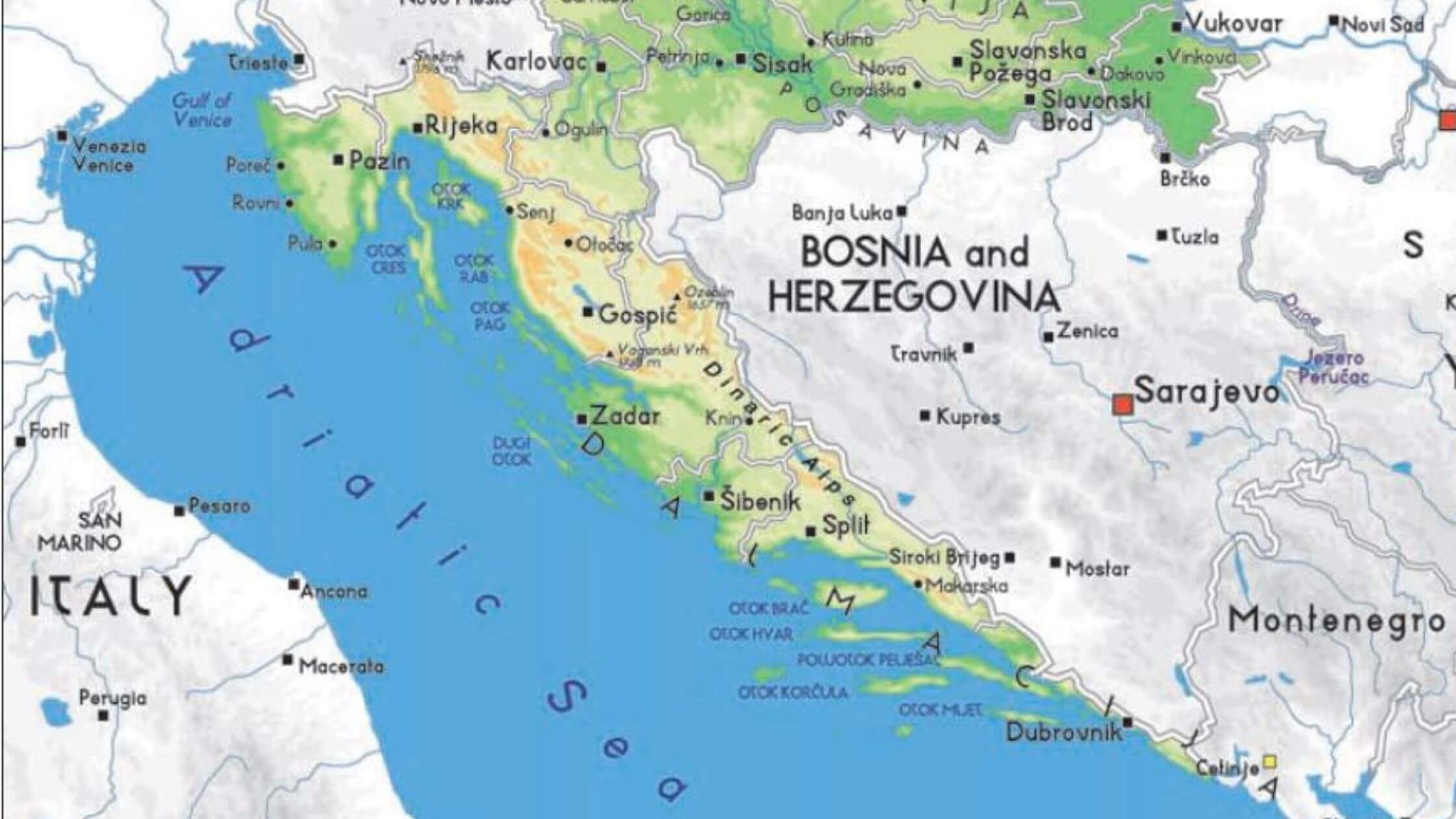
Dalmatia is only one of the 4 wine-producing regions of Croatia. (Image: Geography.name/Screenshot)
18 centuries later, the Dalmatian region continues to produce some of the most well-known, top-quality Croatian wine. As a testament to their growing global recognition, a Pošip from Komarna and Babić from Šibenik, were served to attendees of the 2022 Oscars in Hollywood.
Wondering what characterizes Pošip and Babić wines? Let’s delve into some of the more recognized white and red Dalmatian wines.
White wines of Dalmatia

Croatian white wines are extremely refreshing to sip on during warm summer evenings. (Image: Total Croatia Wines/Screenshot)
Pošip – Pošip, with its greenish to deep honey gold hues and floral aroma, is a white-wine grape variety that was almost exclusively grown on the island Korčula and is indigenous to the village of Smokvica.
Pošip became the first white wine variety in Croatia with a protected geographical origin in 1967. In the last 20 years, Pošip cultivation has spread from Korčula to neighboring islands such as Hvar and Brač, as well as along the coast of Pelješac.

White-wine grapes growing on vines that are usually ready for harvest in the Fall. (Image: Pexels)
Pošip grapes are usually harvested in the first week of September, producing wines with a crisp fruity aroma, containing notes of apples, vanilla, citrus, and almonds. Overall, a balanced and elegant wine that pairs well with fish and shellfish, or for slow sipping on warm summer nights.
Grk – Grk is a golden-green, white-wine grape, indigenous to the sandy soils of Lumbarda on Korčula for over 2,000 years. While most wines are self-pollinators, Grk only produces female flowers and requires a male vine (often Plavac Mali) be planted nearby to enable pollination.
As a result, quantities of Grk produced are often quite small (1000 bottles or less per harvest), making this wine a rarity. The local lore is that wine producers used to only keep bottles of Grk for personal consumption, and to share with close family and friends.

Pair a glass of Croatian wine with fresh seafood. (Image: Pexels)
If you manage to get your hands on a bottle, you’ll find that Grk is a dry white wine that can be adorned with notes of honey, pepper, pear, melon, herbs, and nuts. It pairs well with fish, seafood, chicken, and cold appetizers, but can also be served as an aperitif.
Debit – Another relatively obscure white wine of Dalmatia is Debit, produced from grapes of the same name. Debit is a straw yellow/gold, late-ripening grape variety grown along the northern and Croatian coast. Debit is indigenous to Croatia, but has some tenuous links to varieties in Italy and Turkey.
Why the name “Debit” though? Again, local folklore suggests that the wine’s name is said to date back to the Napoleonic Wars, where Croatian peasants lacked sufficient funds but ensured their safety by paying off French troops in local wine.
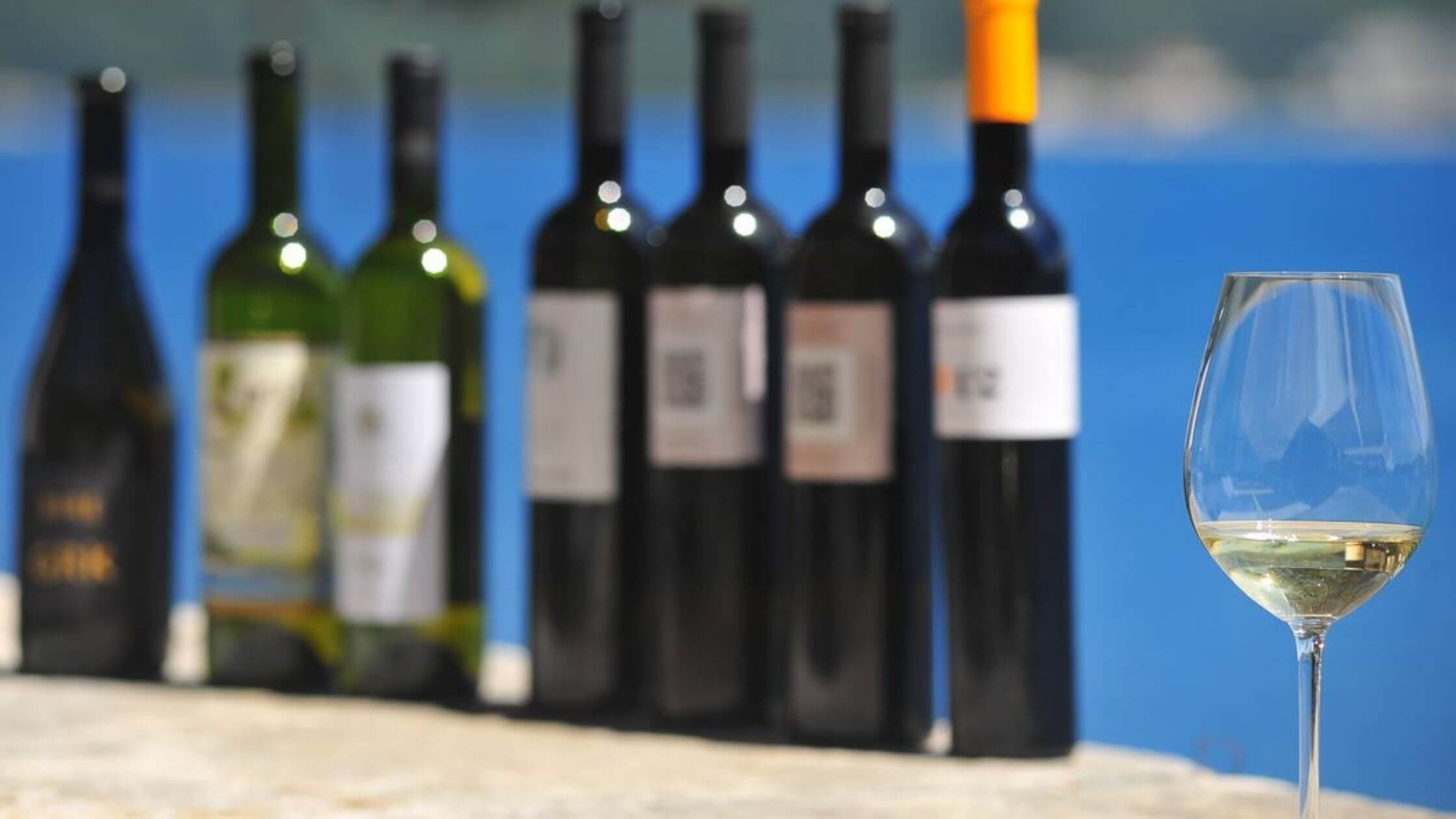
The small island of Korčula produces some of the most well-known white wines in Croatia. (Image: Visit Korčula/Facebook screenshot)
Debit is a fresh, sharp wine with herbal notes and a minerally profile, with some describing the wine to carry hints of limestone and oyster brine. With age, the aromas develop toasty notes like roasted nuts, candied lemons, and browned butter. This wine pairs well with mild seafood, or ingredients like ginger and coconut.
Red wines of Dalmatia
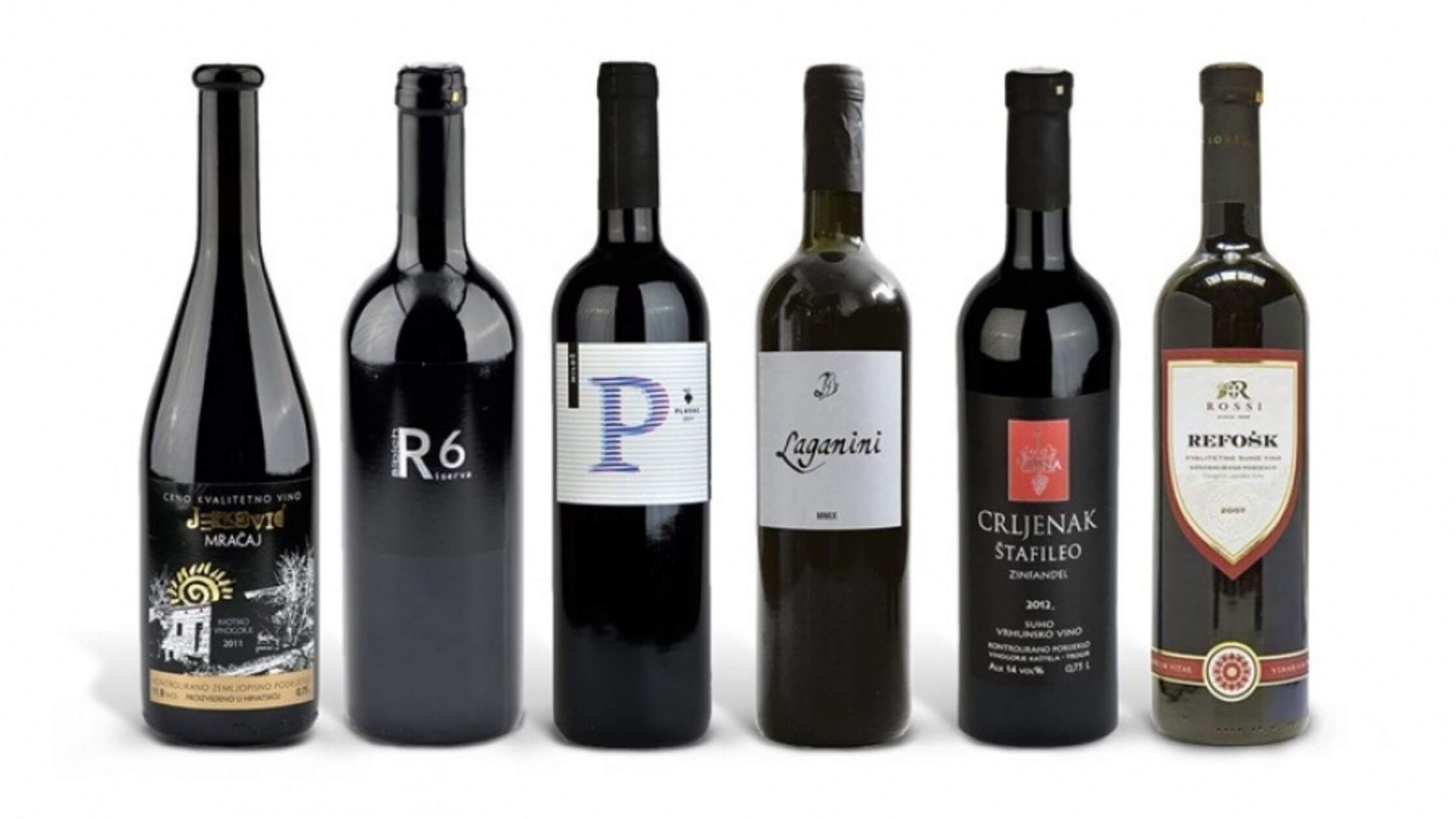
Croatia also produces delicious full-bodied red wines. (Image: Total Croatia Wines/Screenshot)
Babić – Babić grapes are characterized by their blue-red color, with the best quality wine (vrhunsko vino) coming from Primošten vineyards. These grapes are notoriously difficult to grow, with vines often needing a decade or more to reach their full potential, compared to other varieties that may reach that point after 6-7 years.
Upon maturity, vines tend to produce only 3-4 bunches of grapes each harvest due to the harsh soil conditions and intense sun. This leads to more concentrated flavors, imparting bold flavors to the wines.
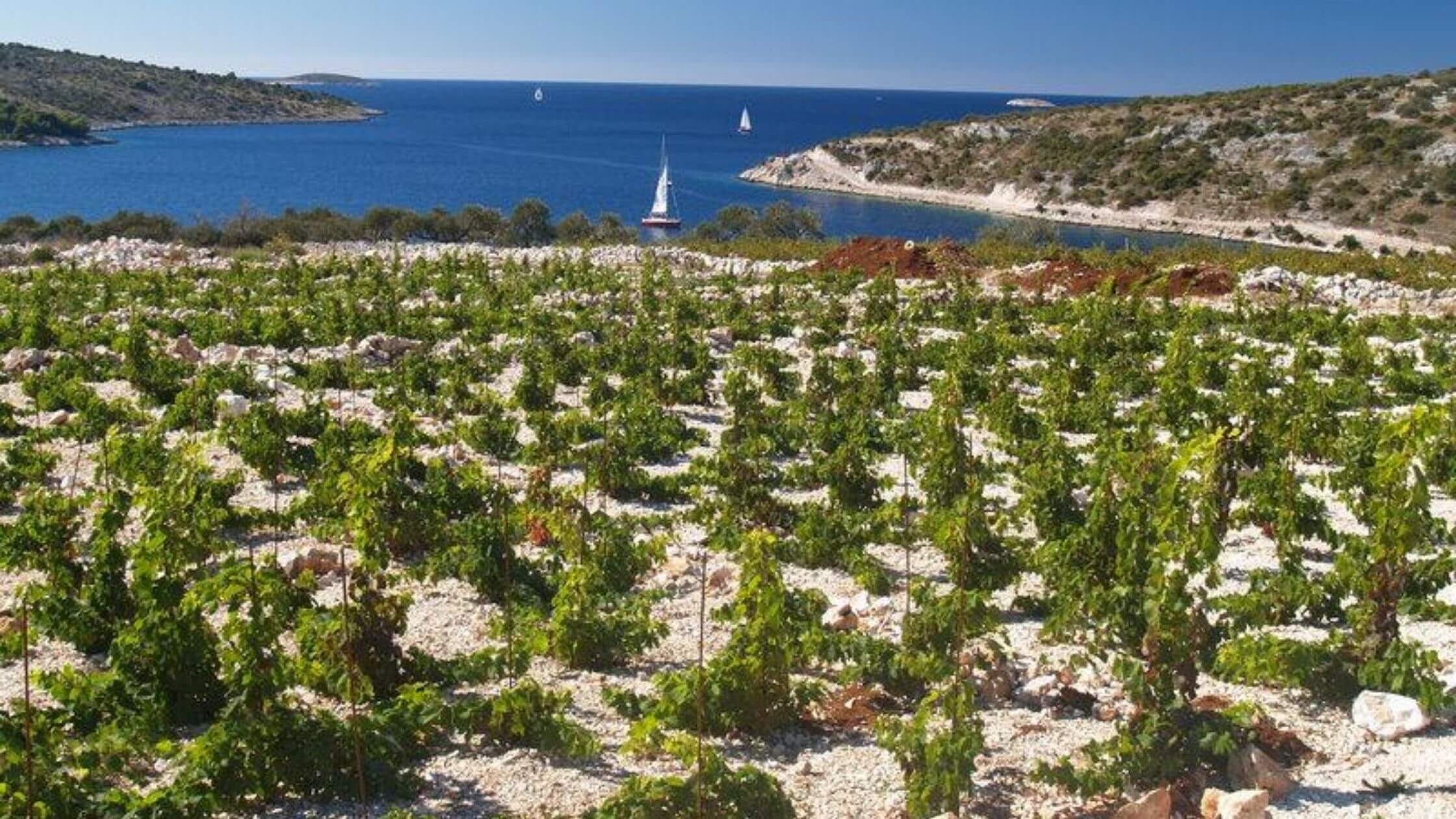
A Primošten vineyard overlooking the Adriatic. (Image: Njuškalo/Screenshot)
Babić wines are dark cherry red in appearance and full-bodied due to their firm tannins. The most common flavors in these wines are sour cherries, plums, and figs. This wine pairs especially well with hearty tomato-based dishes such as goulash or a rich ragu sauce. It also makes a delicious accompaniment to a hearty steak or pork tenderloin.
Plavac Mali – Plavac Mali or “small blue” in English, gets its name from the appearance of the grapes. It is also the most important and protected Croatian red wine variety, so much so that in 2021, experts from the wine industry dedicated a day to celebrate International Plavac Mali Day.
Like Babić, Plavac Mali has low grape yields which lead to concentrated, rich wines with deep burgundy colors. The “fiery” wine is typically dry, higher in both alcohol (12-17%) and tannins, making it slightly bitter, but with mild acidity. It is also full of ripe fruity flavor with notes of blackberry, cherry, smoke, and spice.
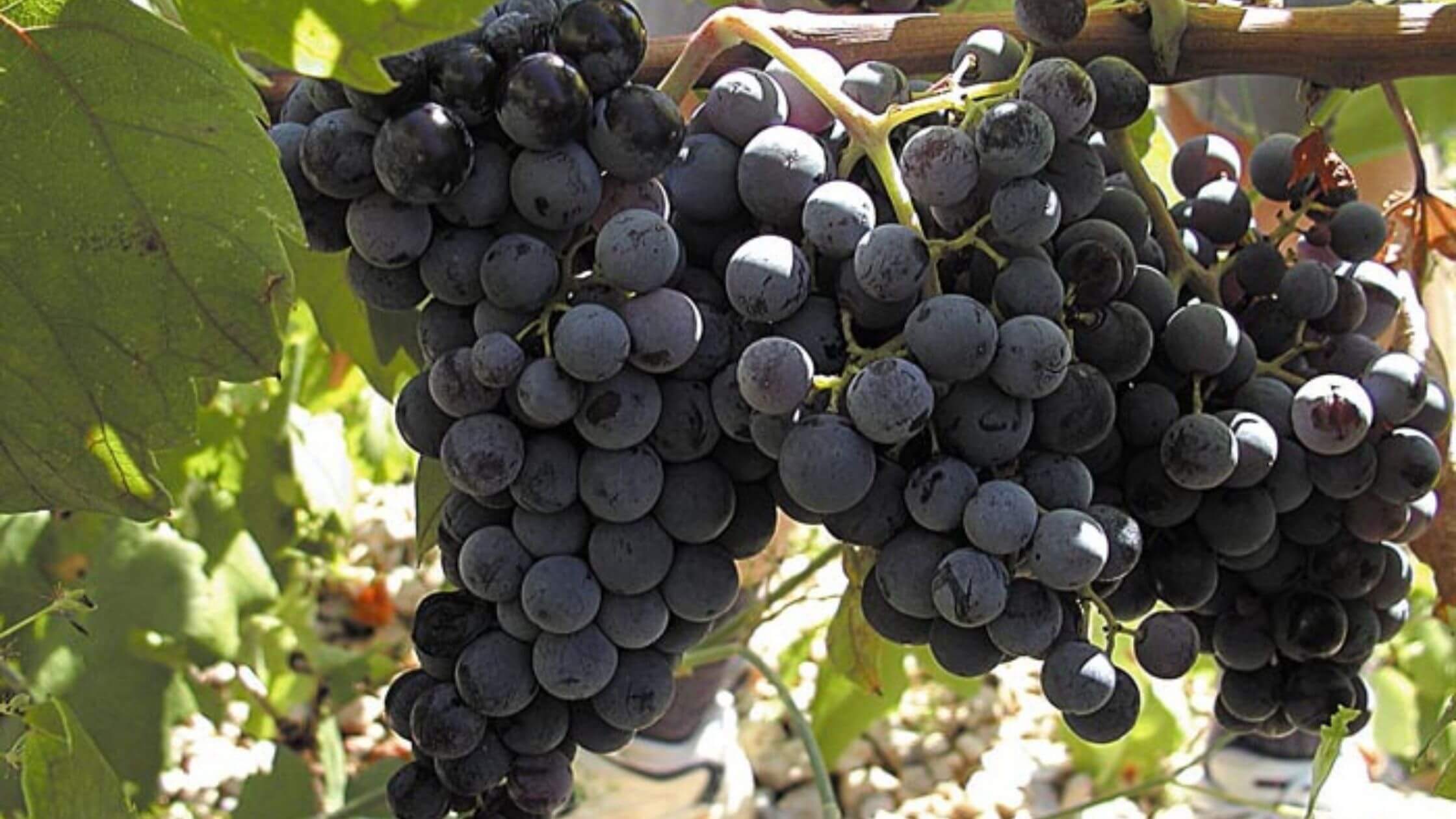
The Plavac Mali grape. (Image: Goran Zdunić/Vinopedia.hr)
This wine pairs well with aged cheese, red meat, and hearty dishes like oxtail stew. A bottle of Plavac Mali would not be out of place at a family BBQ, weddings, or the most luxurious Michelin-starred restaurants in Croatia.
Zinfandel – While Zinfandel is largely known internally as a Californian wine, it was confirmed by researchers in 2002 that its roots are proudly Croatian. Records from the 15th century reflect winemaking from Tribidrag grapes, the variety used to make Zinfandel, on the Dalmatian islands of Hvar and Vis.
Prior to Plavac Mali, Tribidrag grapes were the most abundant red-wine grape in Dalmatia partly due to its tendency to ripen earlier than other varieties. Unfortunately, in the late 19th century, Tribidrag grapes faced extinction due to disease and mildew. An initiative to revitalize Tribidrag production came about in 2001, elevating Zinfandel’s Croatian identity over the next decade.

Croatian red wines tend to pair well with red meats and hearty tomato-based dishes. (Image: Pexels)
Zinfandel wine is a luscious red, with lower tannins than Plavac Mali. It usually carries notes of berries and spices, best paired with cured meats, red meats, and oily fish dishes like tuna.
Croatian wine and grapes are among the best in the world, and you can find more information about them in Total Croatia’s Guide to Croatian Wine HERE.
For more on lifestyle, follow TCN's dedicated page.
Mirela Kardašević Sets New Freediving World Records!
April 5, 2022 - Last weekend, the Zagreb Open Championship in freediving was organized by DPS Zagreb and the Croatian Diving Association - and Croatia's best freediver Mirela Kardašević set two new world records!
On the first day of the competition, Croatia's best diver Mirela Kardašević broke the world record in the women's category of the DINBF discipline, diving 251.2 meters. She will remain recorded in freediving history as the first woman to touch the wall in the 250m in the same discipline, where the record is now 251m, up from 244m.
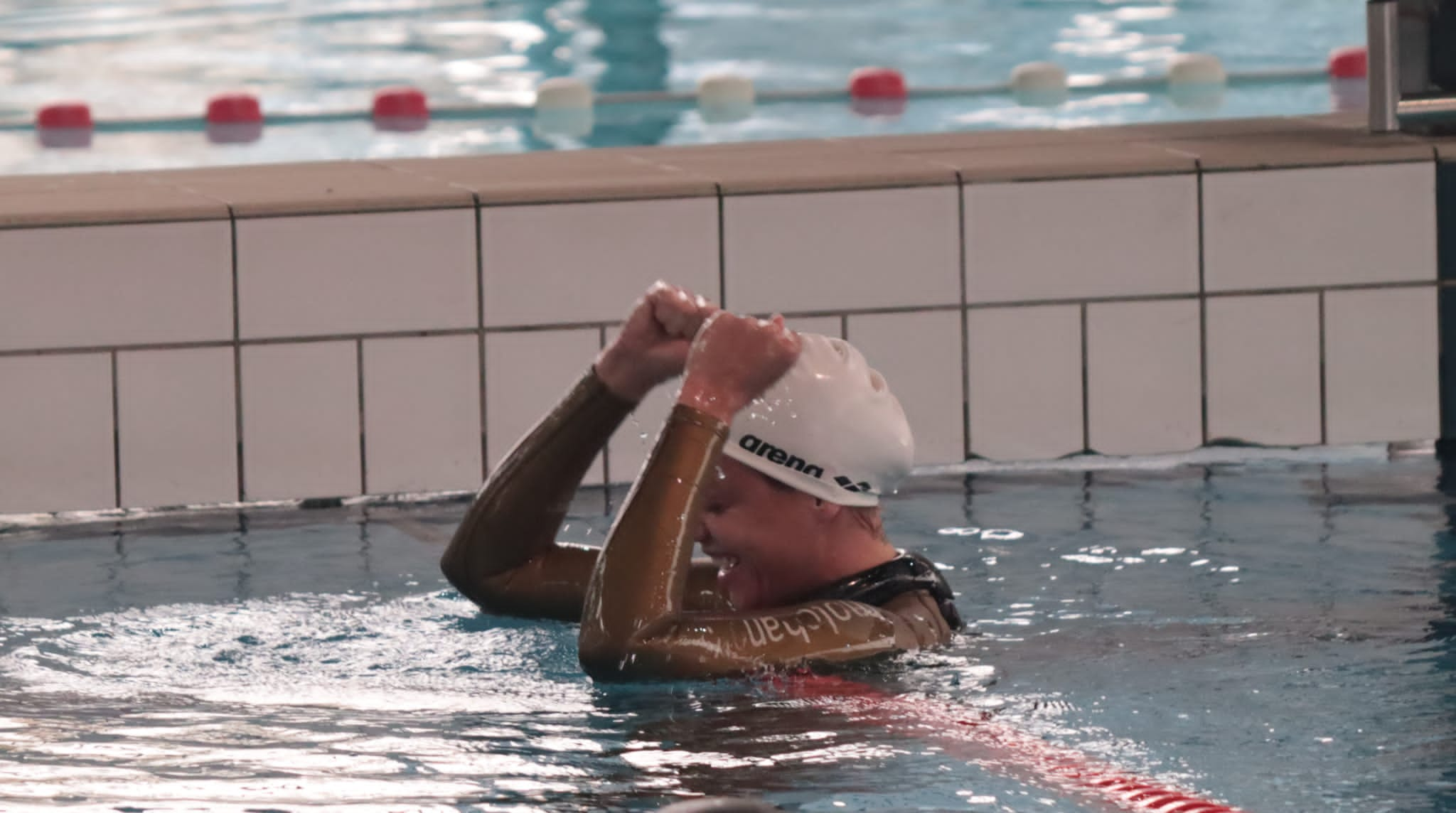
On the same day of the competition in the men's category, Polish freediver Mateusz Malina broke the world record in the same discipline and recorded a result of 282m. Vanja Peleš recorded an excellent result in finless dynamics and reached 208m, while Budimir Sobat took gold in statics where he held his breath for 8 minutes and 43 seconds.
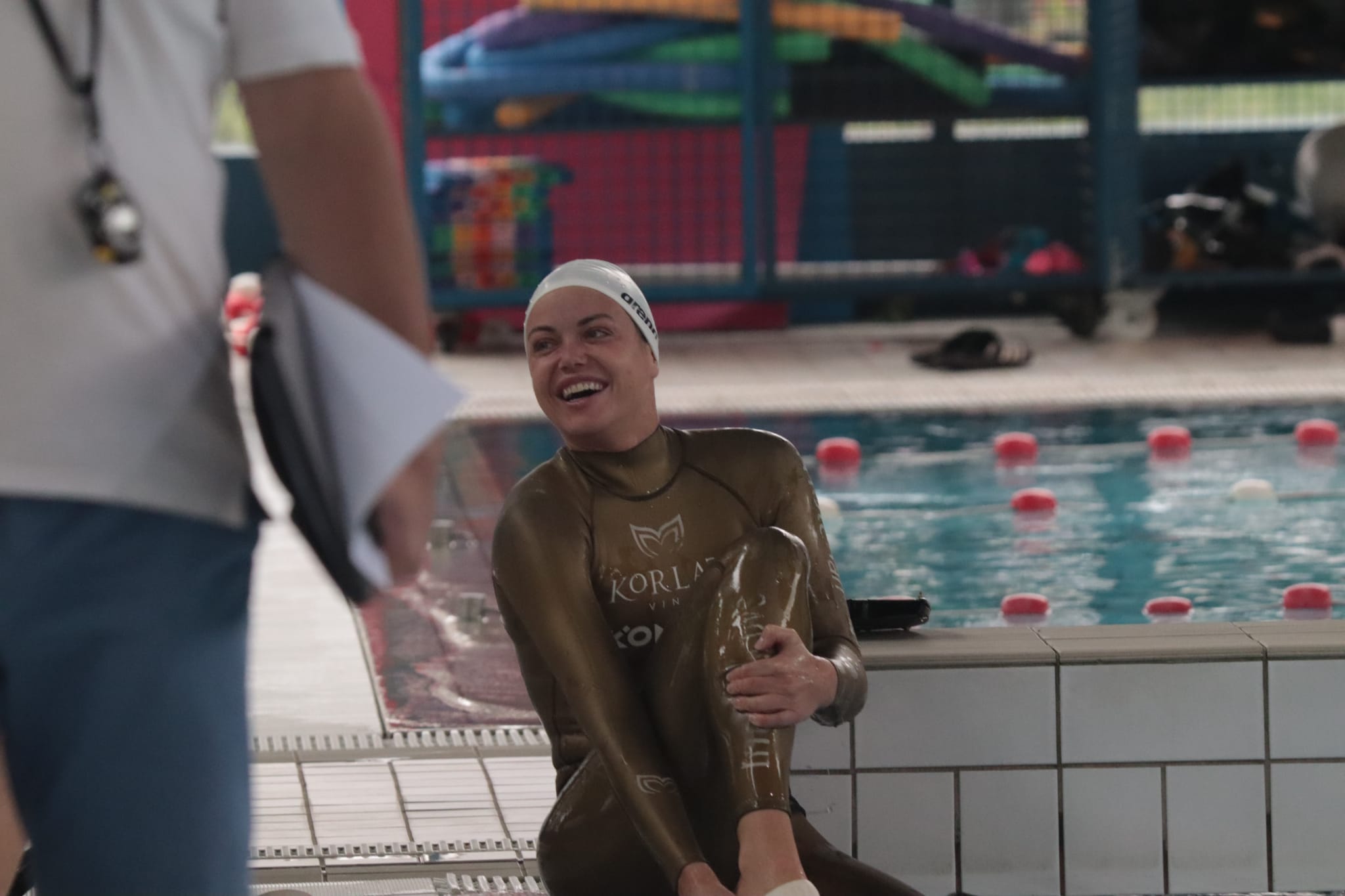
On the second day of the competition, Mirela Kardašević broke another world record, this time in the discipline of dynamics with monofin (MONO), diving 272.70 meters. With this result, she broke the Polish record of 265 m and achieved a record in this discipline for the first time. Vanja Peleš also achieved an excellent result in the monofin discipline, where he won a gold medal with a result of 254.5m.
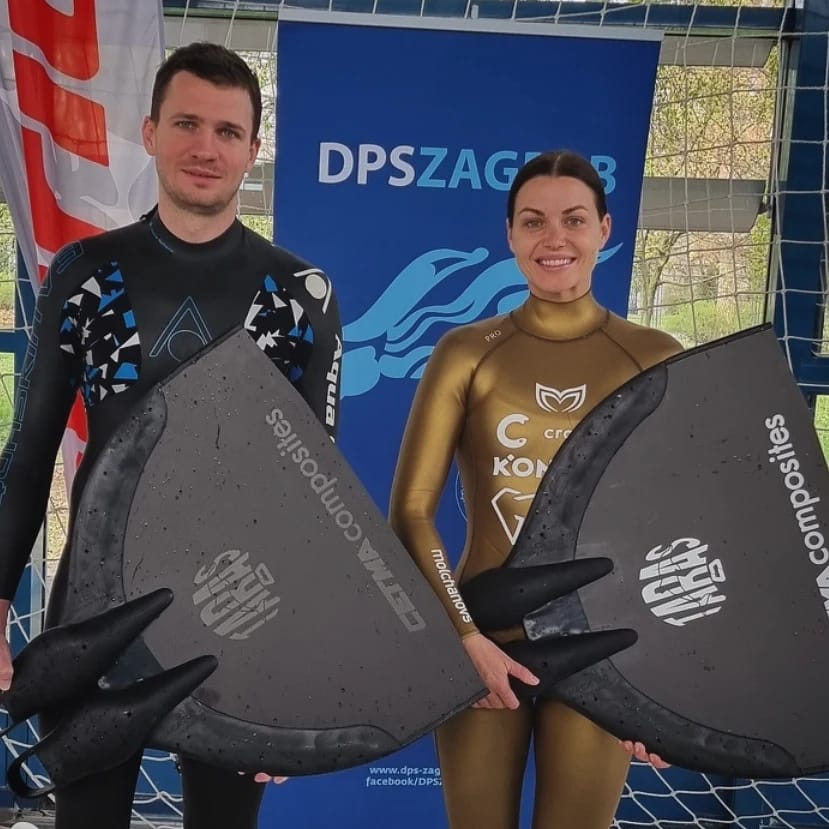
"I still do not believe I achieved this result. I am extremely pleased with how everything went, and I believe this is the best indicator for further preparations before the World Championships. As always, I take this opportunity to thank my coach Ivan Drviš, the DPS Zagreb club, my family, and sponsors who have supported me from the very beginning," said Mirela after setting the record.

This was the last competition and the last test before the World Championships held in June in Belgrade.
To read more about sports in Croatia, follow TCN’s dedicated page.
Turkish Airlines Istanbul-Zagreb Flights Daily, Regular Dubrovnik Flights from April 6
April 5, 2022 - The latest flight news to Croatia as Turkish Airlines Istanbul-Zagreb flights have been running daily since April 1, and three-weekly Dubrovnik flights begin from April 6.
The Turkish national airline and Star Alliance member Turkish Airlines has been operating twice a day between Istanbul and Zagreb since the beginning of April and announced three-weekly flights to Dubrovnik, reports Croatian Aviation.
Turkish Airlines has been operating daily between Zagreb and Istanbul since April 1, bringing the number of weekly rotations back to pre-global pandemic levels. Two flights a day run every day of the week, departing from Zagreb in the morning and evening, thus providing several transfer options through its own hub in Istanbul.
On the route to and from Zagreb, Turkish Airlines uses several types of narrow-body aircraft in April, such as A320, A321, B737-800, B737-900ER, and B737-MAX8, and a total of 21,024 seats are available in both directions in April, with the share of Business Class seats also significant.
From April 6, Turkish Airlines will also operate regularly on the route between Dubrovnik and Istanbul. Three flights a week have been announced, on Mondays, Wednesdays, and Saturdays, and A319, A321 and B737-800 aircraft will operate to Dubrovnik Airport.
In April, 4,246 seats were available between Istanbul and Dubrovnik. It's interesting to note that Dubrovnik recorded 25,645 passengers in March, while in the same month last year there were only 5,069 passengers. Several airlines returned to Dubrovnik on the last weekend of March, and domestic routes, as well as Freebird charter routes, were in traffic for the whole month. In the first three months of this year, Dubrovnik recorded 44,207 passengers, while in the same period in 2021 there were 12,346.
In April this year, Turkish Airlines announced a total of 73 return flights to Zagreb and Istanbul and a total of 25,270 seats available on the market. The number of seats will increase in the coming months when Turkish should increase the number of rotations to Dubrovnik and capacity to Zagreb.
Recall, we recently reported that the 2022 Zagreb summer flight schedule offers 3 million seats on 20 well-known European and international airlines.
For more, check out our travel section.


